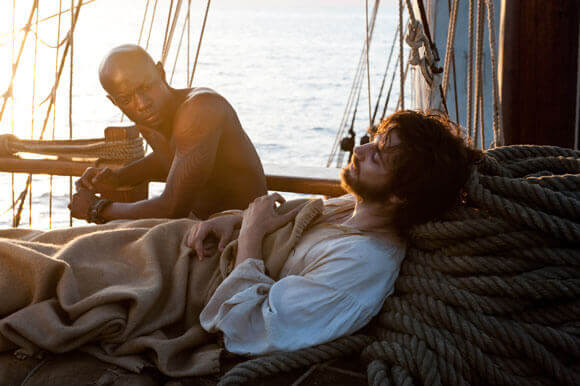
There’s a novel out there in the world called Cloud Atlas, written by David Mitchell, which I have not read (we’ll deal with my illiteracy another time). It consists of six stories set in different time periods, each connected to the next in some fashion via that section’s main character. Themes such as reincarnation, human nature, imprisonment, and class warfare are all readily apparent. The book interrupts each story halfway through, only allowing the sixth story to be told in complete fashion before reversing course to tell the conclusions of each previous story, sort of like rising up a hill and then falling back to where you started.
The concept is intriguing, and many of the stories make for interesting tales. After watching what directors Tom Tykwer and the Wachowskis have done to translate it into a film, I’m left with the feeling that I would have enjoyed the book a lot more than the movie. Obviously, a project as ambitious and multi-faceted as this is no simple undertaking. The $100 million dollar budget was largely composed of independent financing, with only about 20% of that coming from Warner Bros. Also, due to the complexity and variation between the stories, eventually, it was decided that the directors would split up the stories and film them concurrently.
As is my usual predilection, I did zero research prior to watching the film. I knew the Wachowskis were involved but didn’t realize Tykwer also had a hand in directing the film (originally he was going to do it all). After exiting the theater I could identify the three stories I enjoyed the most and the three stories I felt were lacking in impact; not so surprisingly the problem chapters are all directed by the Wachowskis who did the two segments from the future and the one from the 19th century.
The 19th century simply lacked complexity or character development, so it was nigh impossible to care what happened one way or another. Difficulties enjoying the future stem from having already seen The Matrix. A future in which an emotionless ruling power feeds a white nutrient food to a bred stock of de facto slaves? Okay, so it’s not a computer program but the hero helping to fight against the system is made up to look like a bizarro version of Keanu Reeves so trying not to call him Neo the entire time was impossible (I won’t harp on the inclusion of Hugo Weaving because he was excellent in each of his roles for the most part). And I will forgive them the other future tale somewhat because although I’ll blame the tone of that chapter’s resolution and aging the protagonist to keep Tom Hanks involved in them, it was the made-up dialect which is a product of the book that was so frustrating to listen to throughout.
That’s not to say Tykwer is absent of blame. Although his tales set in the 1930s and 1970s were the most intriguing and well-developed, the present-day tale is a tonal misnomer, almost like comic relief for the sake of not maintaining the bleak mood set by the other tales. If I hadn’t gone and discovered this existed in Mitchell’s book, I would have thought it was made up to satiate audiences who might need a mental break since the running time is just shy of three hours (though it feels more like 2 1/2, so that’s not so bad.).
Aside from those directorial issues, perhaps the biggest problem comes from the casting department (and the directors for signing off on it). The majority of the cast is excellent, even Hugh Grant disappears into his characters fairly well, but whether it stemmed from the project being so dependent on outside financing, the inclusion of Tom Hanks and Halle Berry was more distracting than enjoyable for the most part. They work for some of their roles but misfire in others, and it’s very hard to get lost in the characters when all you see is the celebrity poking out from beneath the make-up (stay into the credits for a reveal of which characters were played by which actors).
Of course, as evident by the trailer, the visuals are excellent, and if you are inclined to see the movie, it would be best enjoyed on the big screen where you can really appreciate the scale and beauty of each time period. For some people, impressive environments and the ability to enjoy portions of the film will be enough, and I’m happy for you if that’s the case. I bumped the rating up a touch because I appreciate the ambition of the filmmakers for undertaking the job of translating Cloud Atlas to the screen; their technical prowess and organization skill. But due to the repetitive nature of the stories, and inability to latch onto over half the chapters for a multitude of reasons, this isn’t something that will necessitate repeat viewing and I’m just happy my three-hour sentence in the theater is over and done with.
GRADE: C+
Cloud Atlas hits theaters on October 26, 2012 and is rated R for violence, language, sexuality/nudity and some drug use.






